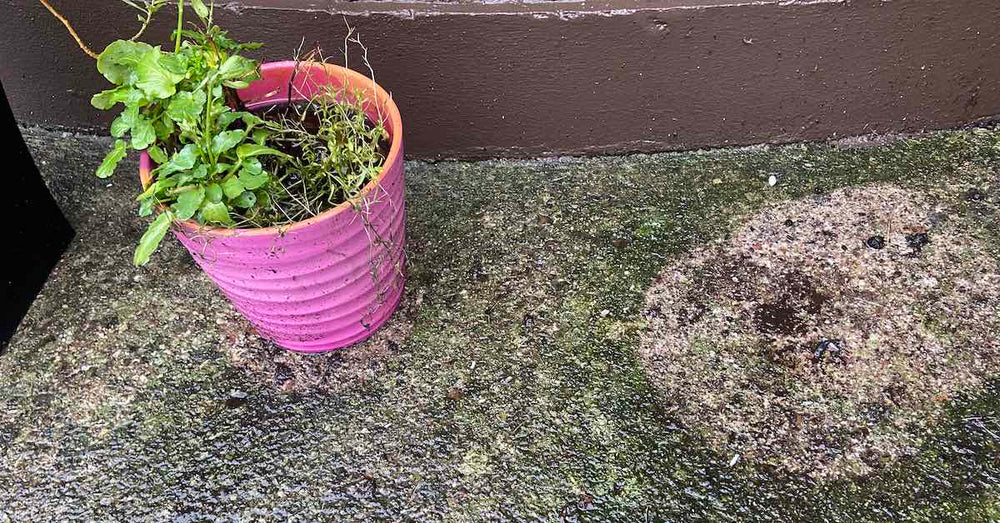
A customer asked us to analyse the reasons why a concrete slabbed patio he'd soft washed with Benz Bio Cleanze recolonised with light green algae.
He reported that some of the slabs had re-colonised after only a few months and was concerned because he had offered a 6-month guarantee.
This is what we told him ...
On concrete patios light green algae can flare up again because of one of, or a combination of, these reasons:
 1. The grouting has failed and is in very poor condition. This gives the algae lots of cracks to hide in and then flare up again. Water lodges in the cracks, which encourages regrowth of the algae.
1. The grouting has failed and is in very poor condition. This gives the algae lots of cracks to hide in and then flare up again. Water lodges in the cracks, which encourages regrowth of the algae.
2. The grass lawn is higher than the patio so what happens is the cut grass blows down onto the patio and then decomposes, breeding algae at the same time. We've often seen a flare up of green algae where grass cuttings have been left on a clean path or drive.
We've noticed this happening when grass cuttings fall off the lawnmower moving from one lawn to another. And of course once algae gets a hold in one place it's easy for it to spread.
3. The drainage is poor and "pooling" is occurring. Patios need a good drainage system as pooling will encourage regrowth of algae. Sandstone is especially vulnerable and if it pools water it will need regular treatments to keep on top of the tendency for algae to recolonise.  4. The customer may have placed plant pots, and/or garden furniture, on the patio after the surface has been cleaned. These quite often overflow and spill soil and other organic material onto a patio. And of course algae can grow under them and spread. Also, the outside of terracotta pots often have a heavy biofilm that will encourage re-colonisation of a treated surface.
4. The customer may have placed plant pots, and/or garden furniture, on the patio after the surface has been cleaned. These quite often overflow and spill soil and other organic material onto a patio. And of course algae can grow under them and spread. Also, the outside of terracotta pots often have a heavy biofilm that will encourage re-colonisation of a treated surface.
5. Moss could be falling from the roof onto the patio and doing the same as the grass in point 2.
6. Leaves from trees could be falling onto the patio and doing the same as grass in point 2.
Because of the above reasons, including the amount of shade and exposure the patio gets, and depending on the surface and general environment, a light re-treatment wtih Bio Cleanze in the autumn, to treat the flare-up of green algae after a summer treatment, is sometimes necessary to be able to keep a patio clean all year long.
This is because the active ingredient in Bio Cleanze is still relatively fresh when the damp, mild conditions come in, thus offering a better chance of keeping the surface free from re-colonising.
The cost of regular re-treatments should be relatively low, as there is very little preparatory work needed compared to a new clean of a surface that hasn't been cared for.
Another approach would be to apply Benz Lightning Cleanze in the summer to get the surface initially clean and then give a treatment of a Bio Cleanze in the autumn/winter as ongoing maintenance.
Re guarantees: Our customer told us he had offered a 6-month guarantee. In the Softwash Services sides of our business we never offer a guarantee for domestic paths, patios and drives because there are so many variable factors involved that are beyond our control.
For example, we cannot control whether our customers sweep up leaves and grass cuttings, or control their placement of plant pots and items of garden furniture. And of course the quality of grouting on patios varies enormously, and is itself subject to decay leading to it becoming a catchment area for algae spores.
 The same applies to cracked concrete paving slabs, where the cracks become breeding grounds for algae spores.
The same applies to cracked concrete paving slabs, where the cracks become breeding grounds for algae spores.
We've found the best approach is to carefully – and tactfully – explain to customers the problems that can arise and what they can do to reduce the propensity for algae to regrow.
And, importantly, explain why the condition of their patio may limit the effectiveness of any soft wash treatment.
We've found that almost everyone is open and receptive to quality professional advice because they know it will help them better maintain their property. Then they won't expect you to work miracles ... but simply do the best you can.
We hope this information was helpful and sincerely wish you great success in your soft washing business,
Team Benz



Responses
Ryanco Concrete Construction
To prevent algae from re-colonizing concrete patios and paths after soft washing, consider these strategies:
Fix Grouting: Ensure grouting is in good condition to prevent algae from hiding in cracks.
Manage Lawn Debris: Keep grass cuttings away from the patio to avoid decomposition that encourages algae growth.
Improve Drainage: Ensure proper drainage to prevent water pooling, which fosters algae regrowth.
Monitor Plants and Furniture: Avoid soil spills from plant pots and keep garden furniture clean to prevent algae spread.
Regular Maintenance: Apply a light re-treatment with Bio Cleanze in autumn for continuous protection.
By addressing these factors, you can significantly reduce the chance of algae re-colonizing your cleaned surfaces.
July 19, 2024
Leo
Thanks for your feedback Tim. Much appreciated. And glad you found this helpful.
March 15, 2022
Tim York
Excellent article. Contains all the info and advice I need to help resolve some issues I was having 10/10
March 15, 2022
Leave a comment